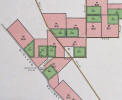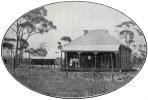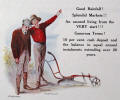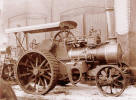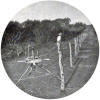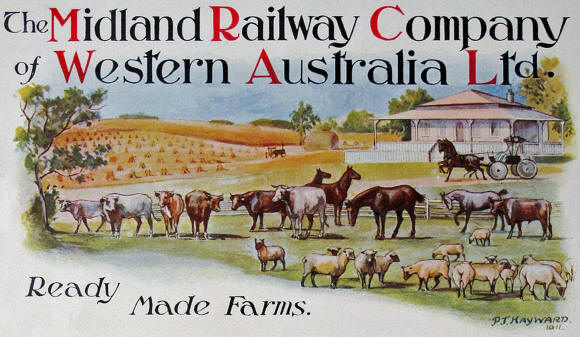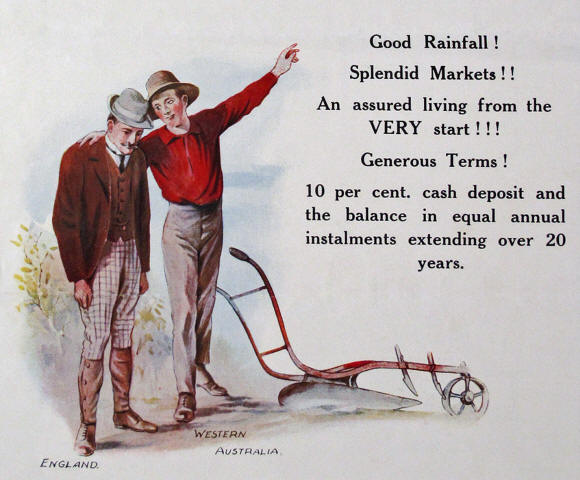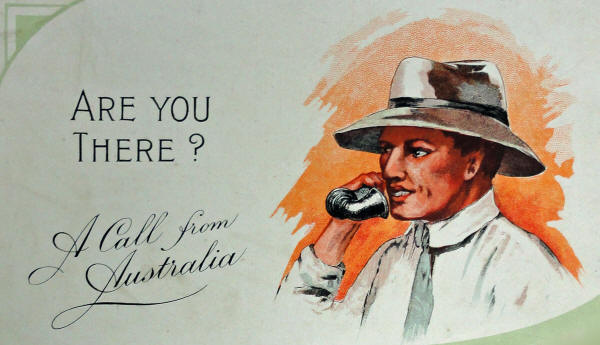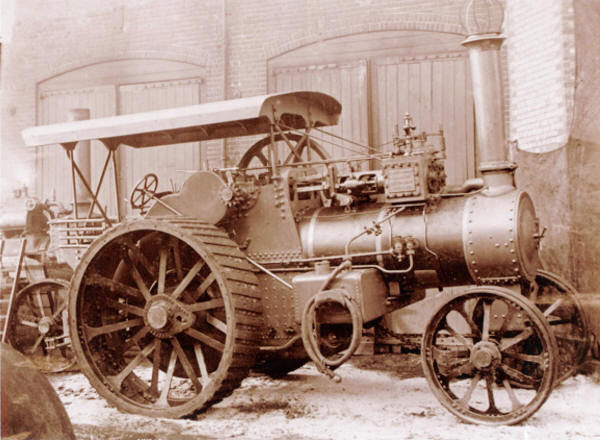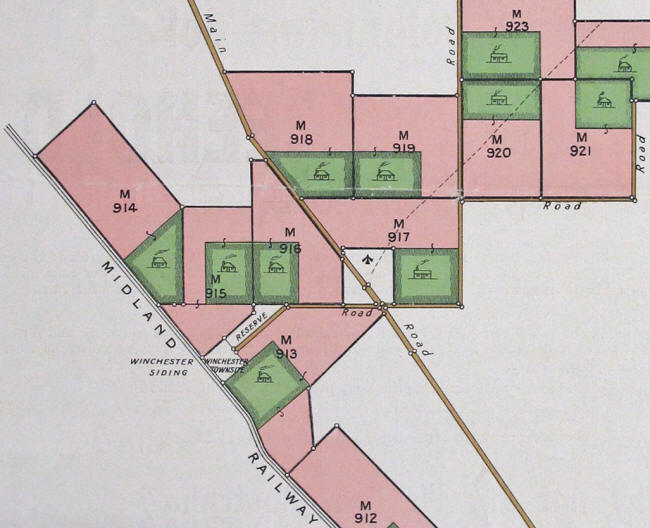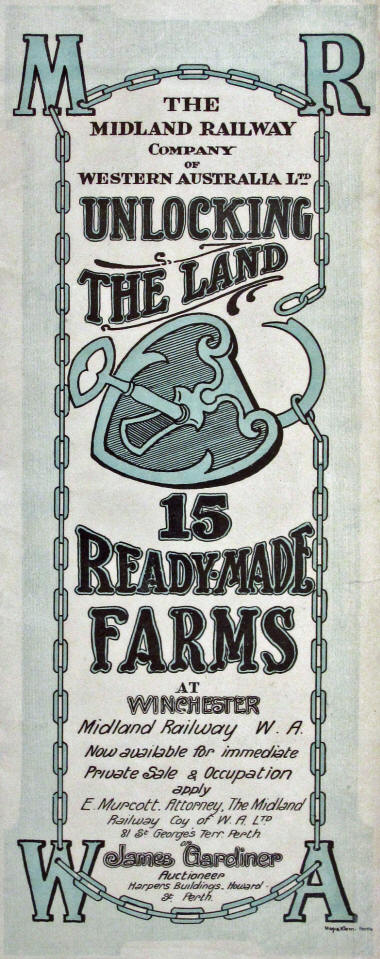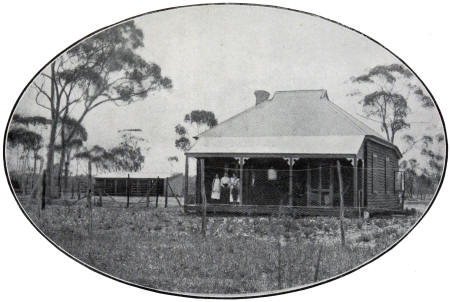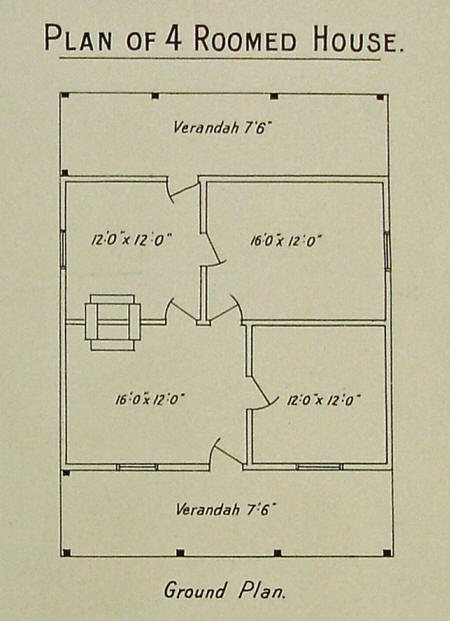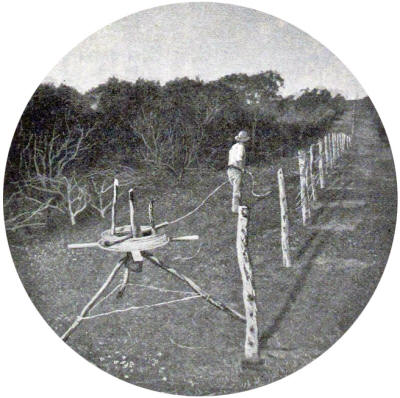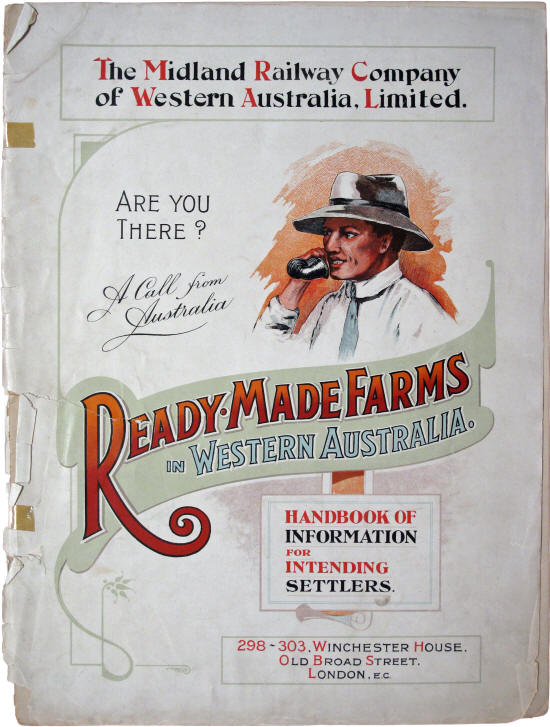for Encouraged
Settlement "
- The Midlands Advertiser, 1910
In 1910 the Midland Railway Company devised a scheme to create and sell "Ready-Made Farms" from some of its land in Carnamah, Winchester and Coorow. The scheme was to sell the land as farms instead of vegetated country, and to market them abroad to encourage new settlement along its railway line.
Between the years 1911 and 1913 the Company hired large numbers of labourers and contractors to carve out 59 farms. On completion each farm of about 400 acres was partly cleared and cropped, had its boundary fenced, contained a jarrah weatherboard house, water supply and stables.
Promotional material, as shown above and to the right, was distributed in England, Scotland, India and South Africa encouraging the British to buy one of the farms and immigrate.
Left: Carnamah's First Tractor
In 1911 the Midland Railway Company imported a steam-powered tractor to assist in the creation of the farms.
The tractor was an eight-horsepower Compound General Purpose Traction Engine made by Richard Garrett & Sons of Suffolk, England. It cost £970.
Right: Farms at Winchester
Each block came with about one third of its acreage cleared - shown in green. To prevent the regrowth of trees on unsold farms the Company grew crops on them. When the farm was sold the buyer was charged for the cost of the crop but then made the profit after harvest.
Below: The Farley family on their Ready-Made Farm in Coorow
The first farm sold was to Capt. Phillip Farley in 1911, who migrated with his family from India to take up a holding in Coorow. By 1916 another 22 families from Australia, England, Scotland, Wales, India and South Africa had taken up farms across Carnamah, Winchester and Coorow.
"I cannot make a living on the land at its present price."
- Robert Niven of Lot M940, Carnamah in 1917
The Company glorified and misled potential settlers on local conditions and the profitability of the farms. They had also charged excessively for the improvements they'd made to the land. The settlers soon realised they'd never be able to survive and pay their instalments.
"I am not impressed by the outlook. We are
fighting the Company all we can. We must have a revaluation if we
are to remain in the district. I like the country and the life but the
land is valued altogether too highly."
- John S. Rooke of Lots M956 and M957, Carnamah in 1917
"They have not slept on a bed of roses"
- The Sunday Times, 13 October 1918
The settlers battled on as they’d put all their money into their farms. The Company greatly assisted them in many ways but resisted revaluing the land or they'd make a financial loss. It eventually came to a point where the Company had to reduce the money owed or many settlers would abandon their farms.
To prevent the collapse of the scheme, and the district they were trying to grow, the Company agreed in 1920 to reduce the prices of already sold farms by a staggering 40 percent. They also gave other concessions such as the 20 years for repayment to recommence from 1920.
With the scheme a financial disaster the Company disposed of all of their unsold Ready-Made Farms in Carnamah to the Repatriation Department of the State Government.
In the end the scheme did have its successes. It
laid the foundation of agriculture and further development in
Carnamah and Coorow. The hindsight of a few more years revealed there had been
other factors at play in the early days of the Ready-Made Farms...
“Most of the settlers came from the Old
Country, and were entirely without knowledge of the conditions
existing here. They had to find out for themselves by hard
experience the different methods of bringing the soil into proper
cultivation, as well as the most suitable varieties of wheat and
oats to sow.”
- John Lang of Lot M945, Carnamah in 1922
Above: Promotional Illustration of Fencing
The remaining Ready-Made Farms became one of four soldier settlement estates established in Carnamah after the First World War. These estates are featured in the permanent exhibition Landmarks: People and Places across Australia at the National Museum of Australia in Canberra.
Right: The Company's Invoice to the State Government
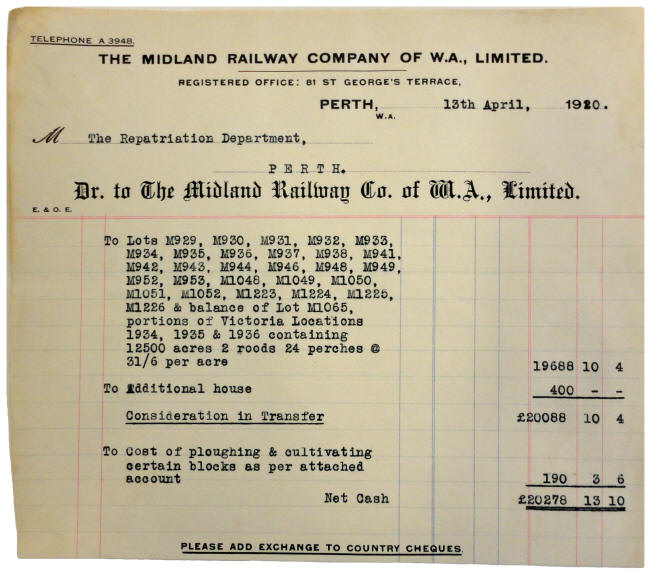
Over 110 Years Later
It has now been over 110 years since the first Ready-Made Farm settlers arrived in Coorow, Winchester and Carnamah.
Only two of the original 23 families are still represented locally.
Ian Bowman and Ken Watson of Carnamah farm their grandfathers' original holdings, although both are now part of larger properties.
Alf Niven, a grandson, farmed locally until 2013 and Ben Armstrong, a great grandson of both the Lang and Robertson families who purchased Ready-Made Farms, was a local farmer until 2014.
Click on the cover to the left to look through the promotional handbook and see if you'd be inclined to purchase a farm!
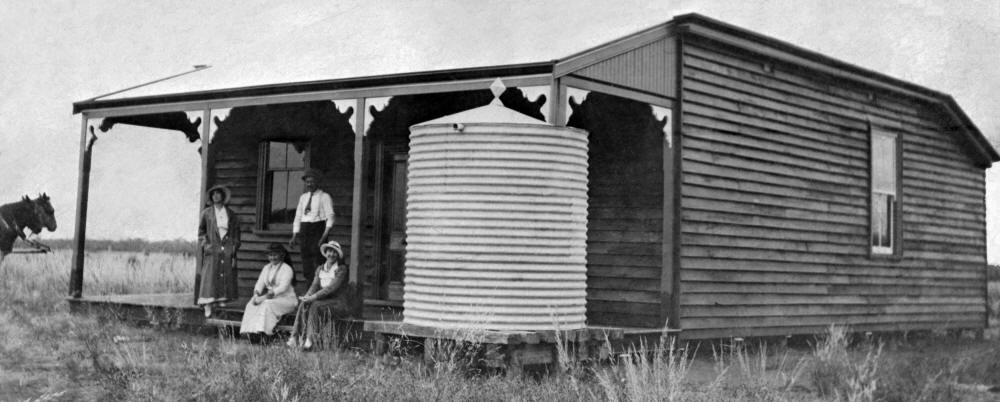
Help enrich our collective history by sharing your own comment, story or memories about Ready-Made Farms. Click here to go to the comment form or send us an email to mail@carnamah.com.au
Does anyone know who the people in the above photo might be, sitting outside a house on a Ready-Made Farm in Carnamah in 1915? It is either the farmhouse of the Niven, Lang, Christie or Robertson family or that of the partnership Bowman & Forrester.
Mary Kelly
My parents came from Scotland, my Father having purchased land off the Midland Railway Co. (which was privately run). It was pioneering days for all settlers in those early years. I do remember the clearing of the land by cross-cut saws and axes and the burning off. The fires would be glowing all night and we enjoyed roasting potatoes.
Richard Sadleir
My aunt Marie Boyd married Jim Niven of Carnamah in the 1940's. The Nivens came out from Scotland landing in Fremantle the day WW1 was declared. The parents had 13 children. Robert ("Bob"), Jim, Tom, Jake, Alec and Archie all farmed in the Carnamah area. Margaret, Annie, Betty, Jean and Agnes started St Andrews private hospital in Midland Junction. The family arrived to a whitewashed stretched wheat bag shack but survived the influenza epidemic. The boys wore their kilts to school until laughed out of it.
The father died in 1918 and the oldest son Bob took over running the farm and the large family when he was 18. He was a very successful farmer and his mother transferred to property of 1640 acres to him in 1939. Five of the brothers served in WW2.
Jo Hyland
I have really enjoyed reading this story of the ready-made farms. My ancestors also took up land around this region around 1910 - also from Wales and in Moora but alas in the end could not make their farm work with death due to mining injuries and war and walked off the land in 1922 moving to Collie.
V i r t u a l M u s e u m :
Macpherson ● Railway ● War ● Town ● Schools ● Roads ● Business ● Milk ● Electricity ● Tearooms ● Post ● Books ● Toys
Now featuring 10863 Bushranger presented by Act Belong Commit






